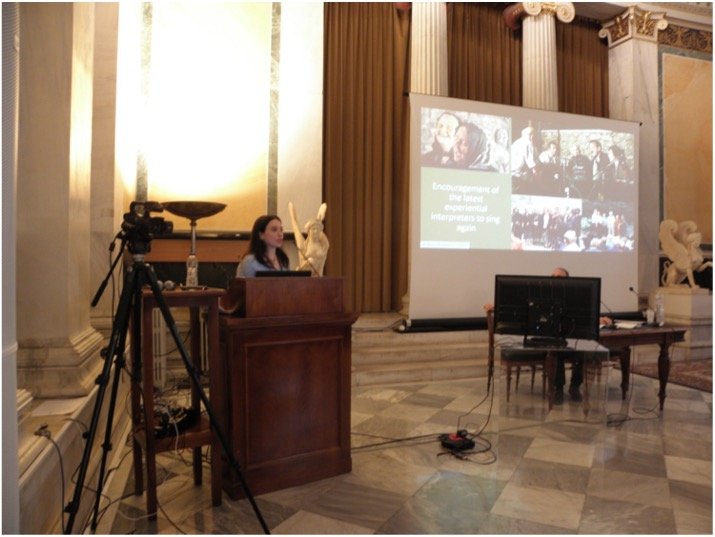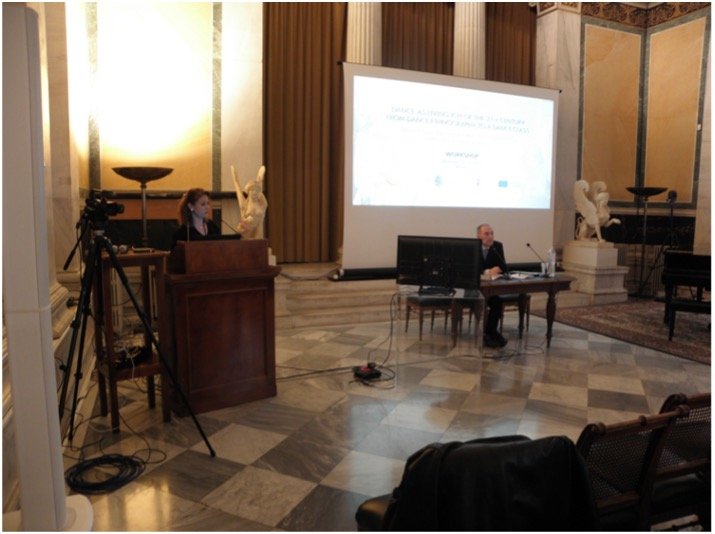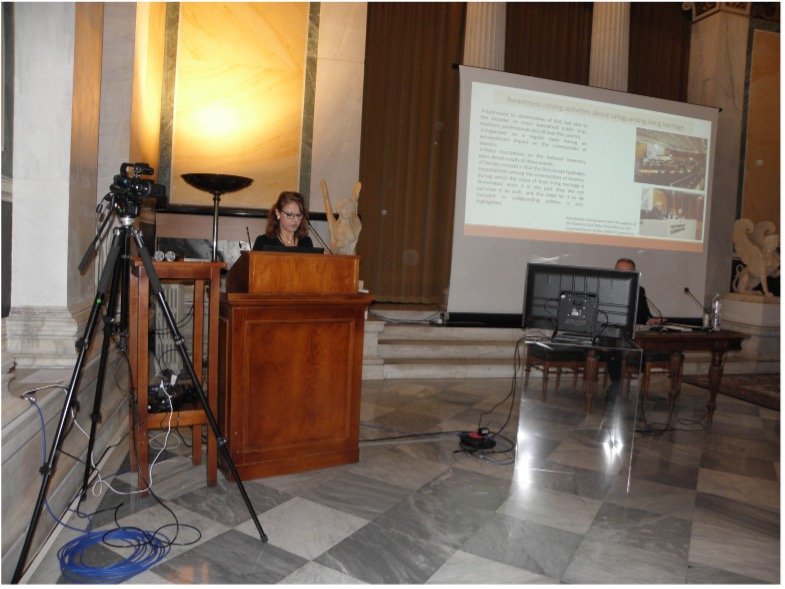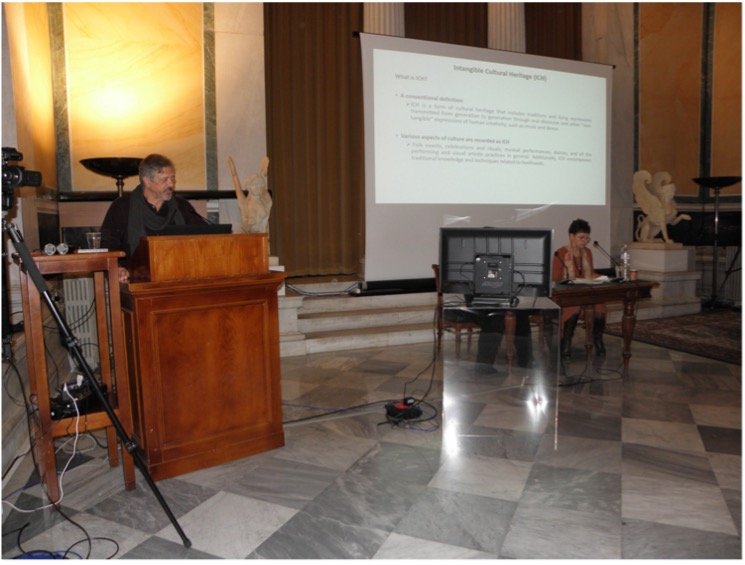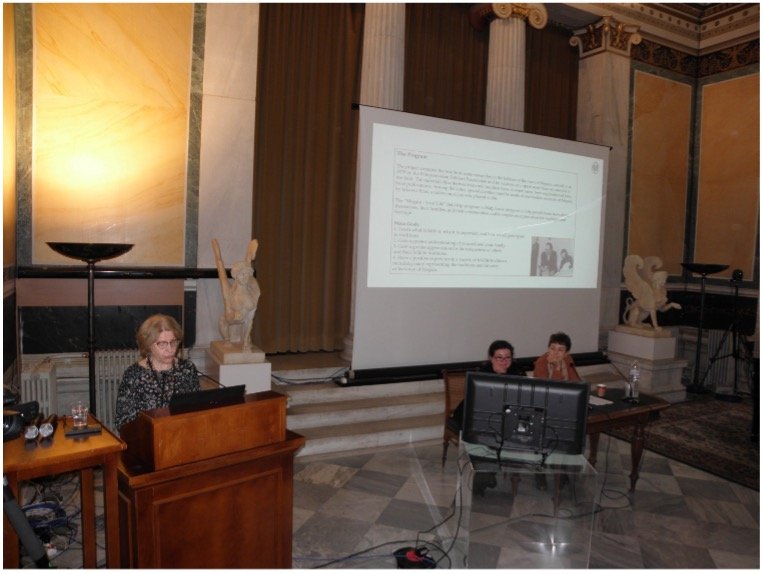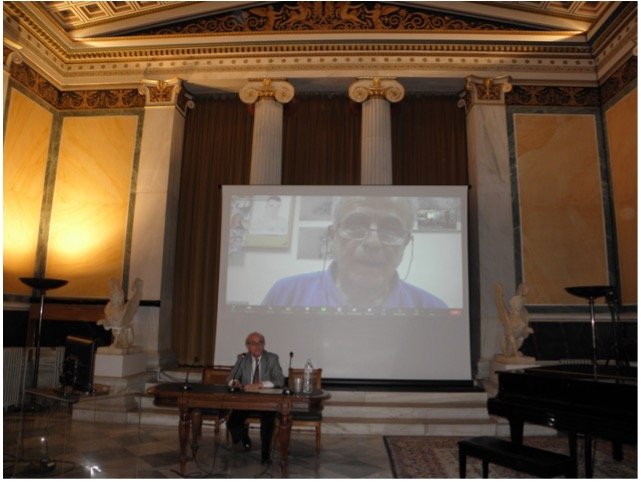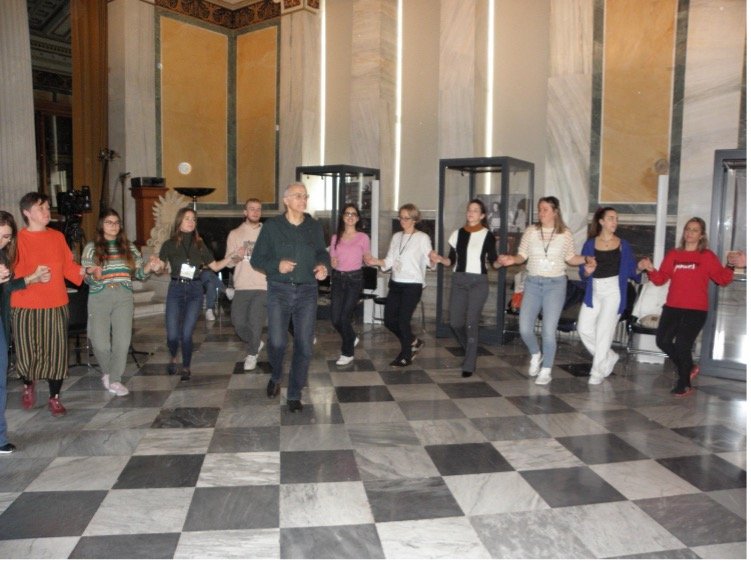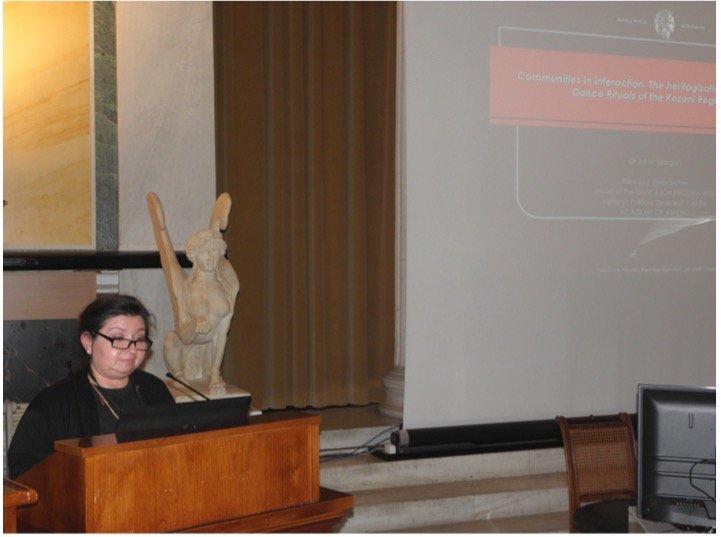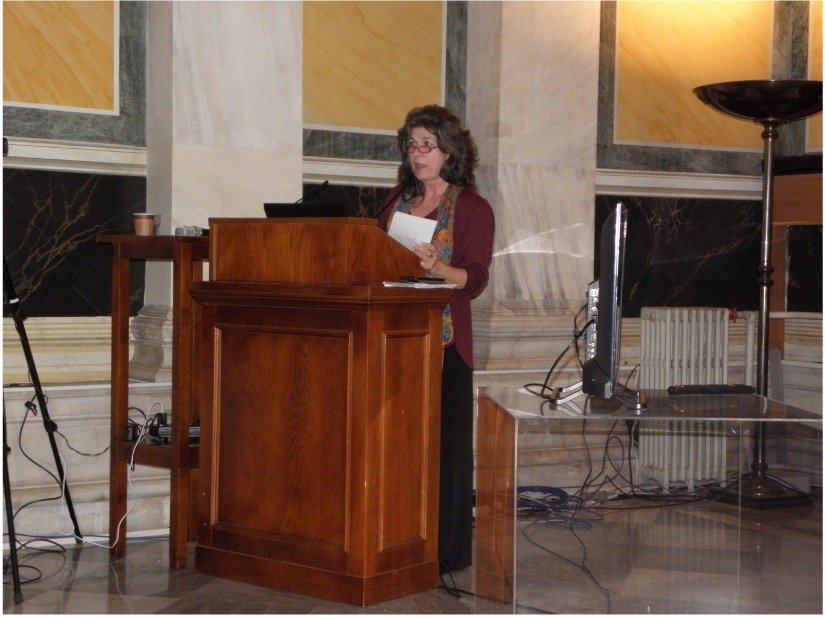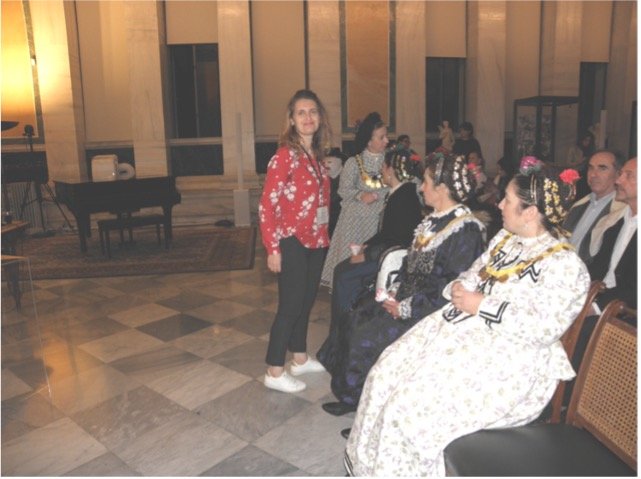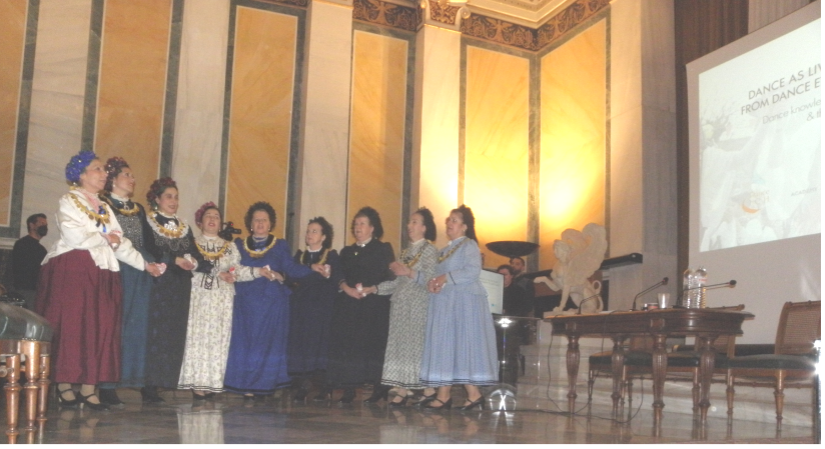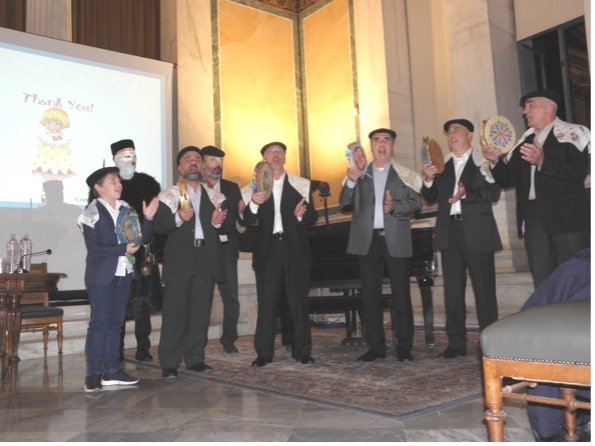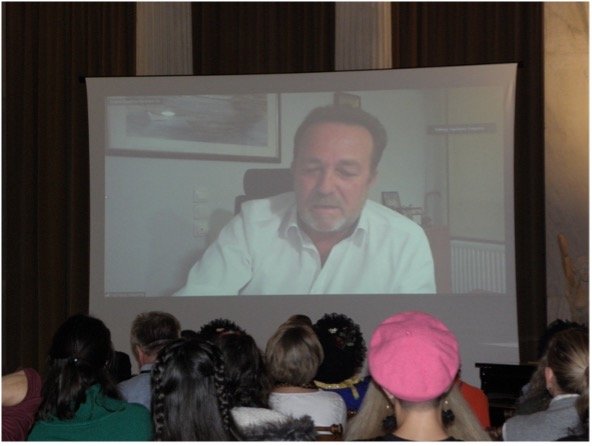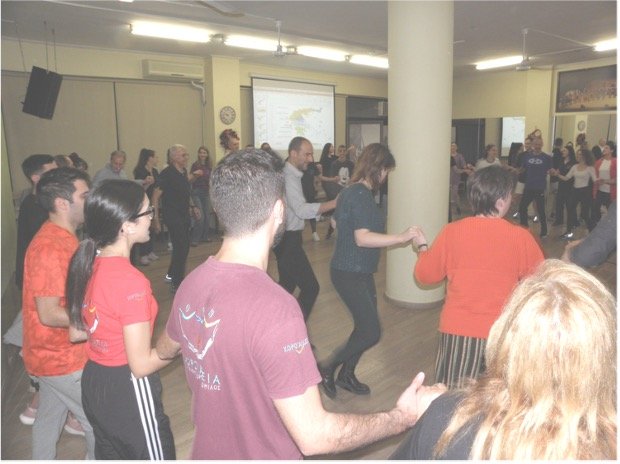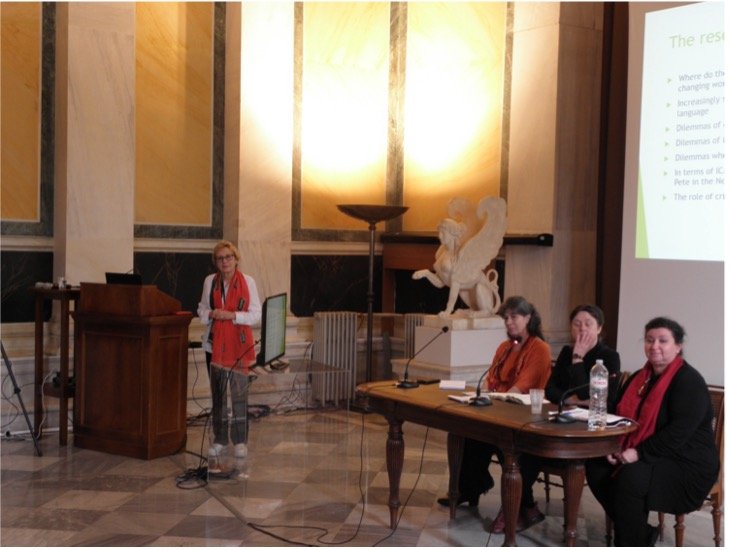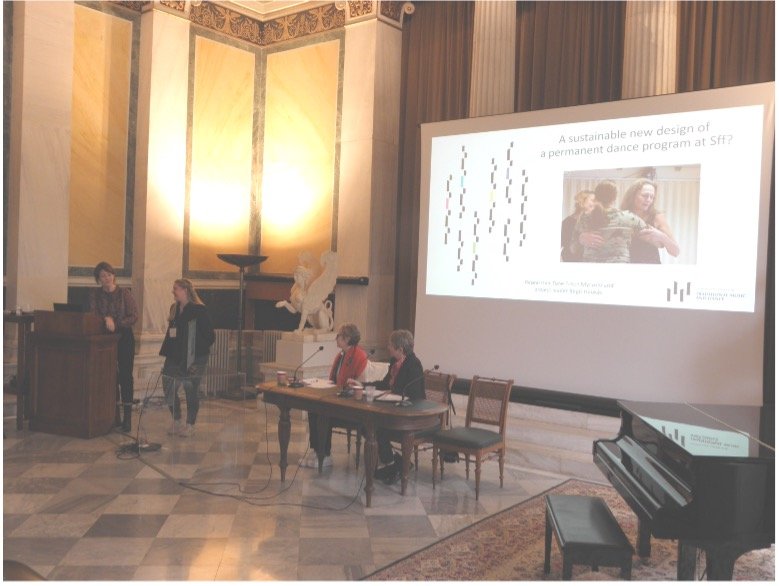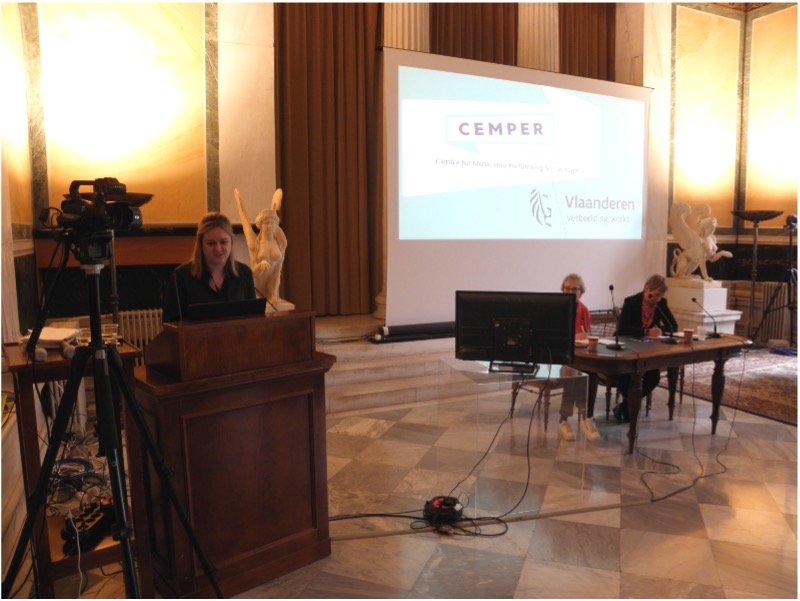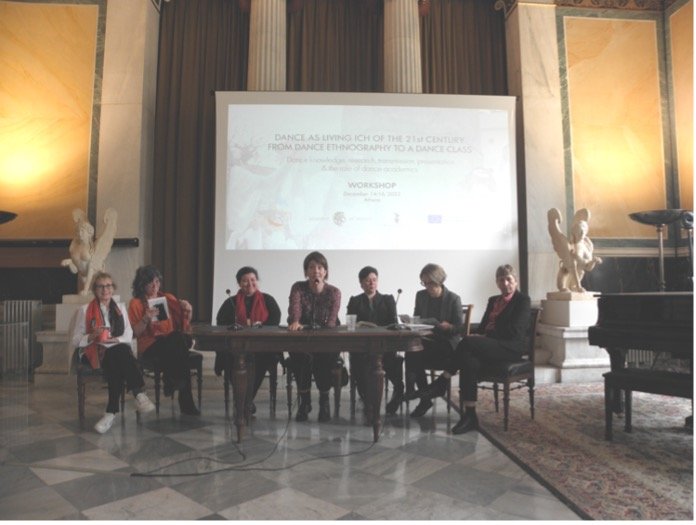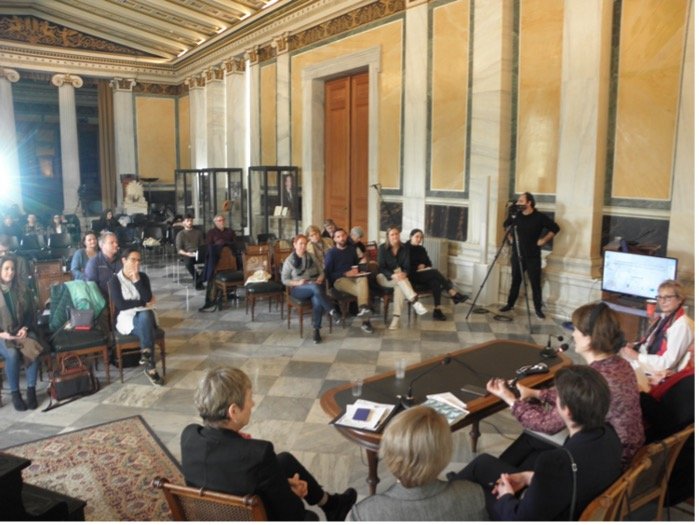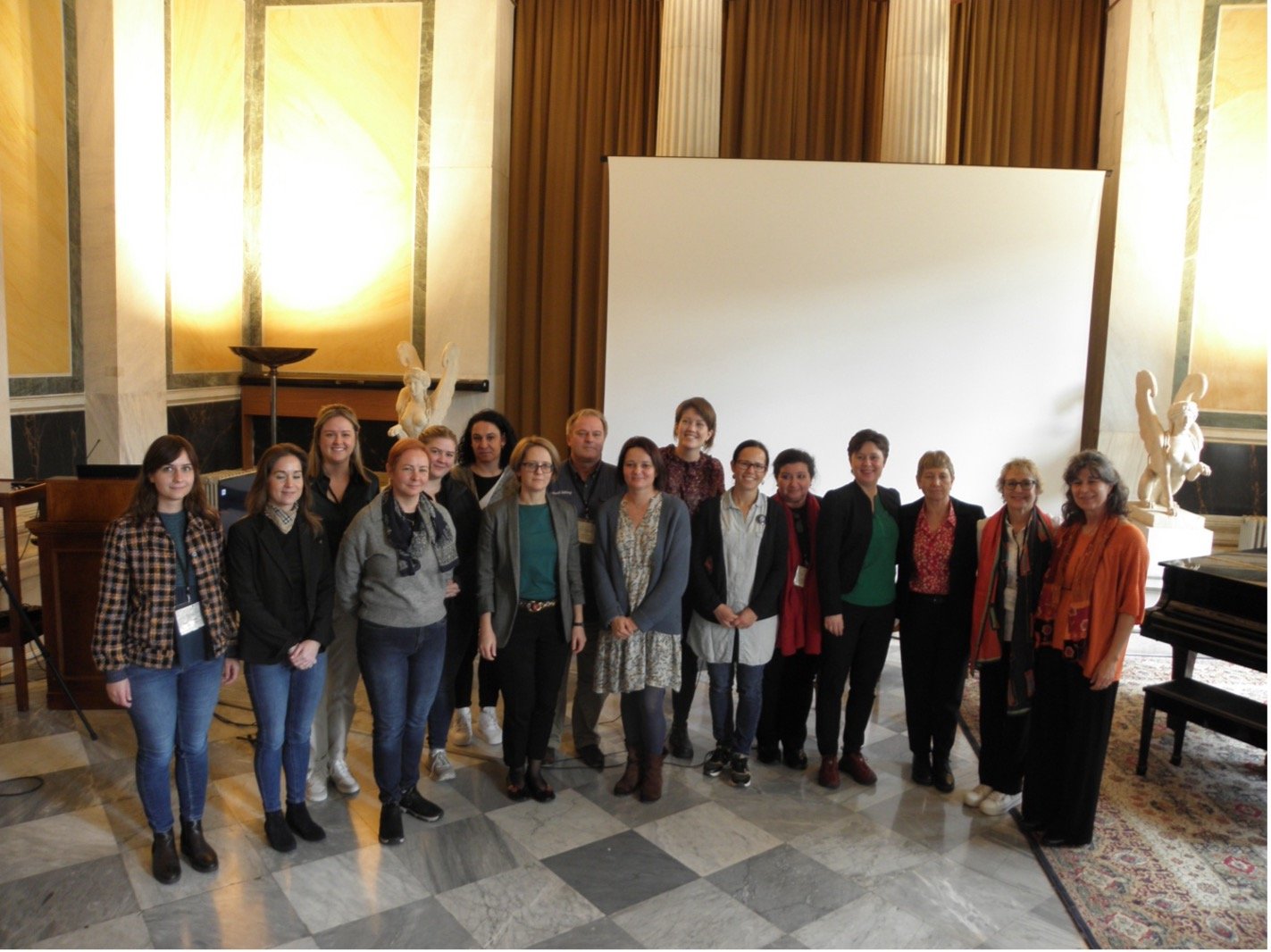Report from Workshop 4
All words and photos by Zoi N. Margari, Hellenic Folklore Research Centre – ACADEMY OF ATHENS
From December 14 to 16, 2023, we gathered in Athens at the historic building of the Academy of Athens for our fourth project workshop. Hosted by our partner, the Hellenic Folklore Research Centre of the Academy of Athens, the workshop, titled "DANCE AS THE LIVING ICON OF THE 21st CENTURY: FROM DANCE ETHNOGRAPHY TO A DANCE CLASS," was dedicated to dance knowledge, research, transmission, presentation, and the role of dance academics. The live streamed program included presentations, workshops, and participatory dance events, as described briefly in this report.
Day 1: Thursday 14th December 2023
Morning sessions
One of the main aims of the programme was to learn about the Greek example. With this in perspective, the first session included general introductory presentations focused on the peculiarities of the Greek case.
So, Stavroula-Villy K. Fotopoulou, Head of the Directorate of Modern Cultural Heritage at the Hellenic Ministry of Culture and Sports, presented the practical implementation of the Convention for the Safeguarding of Intangible Cultural Heritage at the national level in Greece.
Αliki Gkana and Alexandros Lampridis, Leaders (“Kiratzides”) of the Polyphonic Caravan which was selected as a UNESCO Good Safeguarding Practice in 2020, presented its methodological and practical background and how it became a method for the transmission of intangible cultural heritage on the UNESCO list.
Elena Bazini, member of the Directorate of Modern Cultural Heritage at the Hellenic Ministry of Culture and Sports and UNESCO ICH Facilitator presented examples of the implementation of the Convention for the Safeguarding of Intangible Cultural Heritage at the national level in Greece.
Based on the Greek example, one of the main aims of the programme was,to discuss about the theoretical and methodological issues arising after the implementation of the UNESCO convention on intangible cultural heritage. With this in perspective, this session was dedicated to epistemological considerations from the perspective of cultural anthropology.
Thus, Dr Pavlos Kavouras, Emeritus Professor, National and Kapodistrian University of Athens, Head of the UNESCO Chair "Anthropology of Traditional Music: Representing and Repositioning Intangible Cultural Heritage" discussed theoretical and methodological issues, that consearne greatly the academic community. His presentation titled “The UNESCO convention on intangible cultural heritage from the perspective of cultural anthropology: Issues of representation and repositioning of traditional music and dance” endeavored to explore the pivotal role of cultural anthropology in comprehending and interpreting the UNESCO Convention on Intangible Cultural Heritage, with a specific focus on traditional music and dance.
In the course of the workshop, building upon the presented theoretical and institutional frameworks, particular emphasis was placed on exploring how dance, as living intangible cultural heritage, is approached within different institutional contexts. Commencing with the Greek case, this section delved into issues related to dance as intangible heritage within the activities of museums and cultural foundations.
Panayiota Andrianopoulou, Head of the Collections, Research and Documentation of Folk Art Department of the Museum of Modern Greek Culture (MMGC) and UNESCO ICH Facilitator presented examples of Museum of Modern Greek Culture. In her presentation titled "The carnival events at the Museum of Modern Greek Culture: dis-placement of ritual enactment in the urban context", discussed the Museum’s long experience as it is the only public metropolitan museum dealing with the material and intangible cultural heritage of the modern Greek state.
Next, Vasiliki Polyzoi, Head of the Museum of Greek Folk Instruments "Fivos Anoyanakis" – Centre for Ethnomusicology presented examples of the Museum of Modern Greek Culture. In her presentation titled "The Museum of Greek Folk Instruments “Fivos Anoyanakis” - Centre for Ethnomusicology as a venue for highlighting and safeguarding the musical heritage, including dance", Polyzoi discussed the Museum’s extensive experience and focused on its implemented policies for safeguarding the musical heritage, which encompasses dance.
Dr Irene Loutzaki, Curator at the Vassilios Papantoniou Foundation and Member of the National Scientific Committee for the Implementation of the Convention for the Safeguarding of the Intangible Cultural Heritage (UNESCO 2003) followed. Dr Loutzaki presented examples from the Foundation's cultural practices and, discussed its experience in dance, by focusing in the case study of its educational program, "Megara – Your Life".
Afternoon sessions
The objective of this specific section was to address issues related to the management of dance as living cultural heritage within the social postmodern multicultural context. Drawing inspiration from the Greek example, we focused on studying the activities of cultural associations operating in both Greece and abroad.
Dr Dimitris Goulimaris, Professor at the School of Physical Education and Sport Science of the Democritus University of Thrace, in his presentation focused on the case study of the functions of traditional dance and their inseparable relationship with the activities of cultural associations.
Additionally Dr Filippos Filippou, Professor at the School of Physical Education and Sport Science of the Democritus University of Thrace, in his presentation focused on the study of methodological and theoretical issues arising when studying and teaching “Greek Traditional Dance”. He focused on the case study of the stage presentation of Greek dance and more specifically on the transmission of the taught knowledge, gained in the academic context and in that of cultural associations.
Starting from dance and the dancing experience as living cultural heritage, the aim of the following session was to study the intricate relationships of the dancing body and technology.
Dr Stella Douka, Professor at the School of Physical Education and Sport Science of the Aristotle University of Thessaloniki, opened the session. In her presentation delved into methodological, theoretical, and analytical issues. She explored the integration of technology into traditional dance, examining questions arising from various examples that involve multi-sensor technology and fuzzy logic for analyzing a dancer's body movement and evaluating performance.
Dr Katia Savrami, Associate Professor at the Department of Theatre Studies of the University of Patras, followed. In her presentation, Dr Savrami focused on studying the dancing body as a social agent. She presented relevant academic examples and underscored the importance of the scientific approach to dance and the dancing body. Dr Savrami pointed out that in academic discussions, dance is often analyzed for its ability to reflect and influence social structures and relationships therefore, as an academic discipline, it is essential to address issues such as living heritage through its approach.
The final session of the day was dedicated to the official Welcome Ceremony. Addresses were delivered by representatives of the hosting organization, the Hellenic Folklore Research Centre (HFRC) of the Academy of Athens (AA). Dr Evangelos Karamanes, the Acting Director of the HFRC, and Dr Zoi N. Margari, Head of the Dance ICH Programme for the AA, presented the institution's extensive research history and extended a warm welcome to all participants. Additional addresses were given by the Project Leader of the ‘Dance-ICH’ Programme, Tone Erlien Myrvold from the Norwegian Centre for Traditional Music, followed by addresses from the Hellenic Ministry of Culture and Sports, the Hellenic Ministry of Foreign Affairs, and the National and Kapodistrian University of Athens (the second Greek partner of the project).
Day 2: Friday 15th December 2023
Morning sessions
The objective of the first session was to delve into issues concerning the management of folk-popular culture as intangible cultural heritage. Drawing inspiration from the exemplary case of the Hellenic Folklore Research Centre [HFRC] of the Academy of Athens, it scrutinized topics related to the scientific practices of studying culture over time, exploring the relationship between ethnographic research, cultural heritage analysis, and management.
Dr Evangelos Karamanes, Research Director-Acting Director of the Hellenic Folklore Research Centre of the Academy of Athens and Member of the National Scientific Committee for the Implementation of the Convention for the Safeguarding of the Intangible Cultural Heritage (UNESCO 2003) in his presentation focused on the study of methodological and theoretical issuses arising in the academic context while the contemporary framework for studying, preserving, and disseminating folk-popular culture has changed. The changes and transformations that occurred over time were analyzed, and the inseparable relationship that has developed between the researchers of the Centre and the ethnographed local communities was examined. Thus, the theme of collaboration and partnership between members of the scientific community and local communities emerged, constituting a fundamental axis of the Centre’s operation today.
Dr Ioannis Karachristos, Principal Researcher of the Hellenic Folklore Research Centre of the Academy of Athens in his presentation focused on the study of methodological and theoritical issuses arising while working with communities. Dr Karachristos, examined the process of preparing the dossier for the inscription of the “Intangible culture of urban historic cafes” in the Intangible Cultural Heritage National Inventory of Greece, a process that was undertaken by a group of “experts” in close collaboration with the community of bearers. The study involved close collaboration between experts and the café community, emphasizing embodied aspects of café culture. The presentation concluded with reflections on scientists' roles as facilitators in the community's journey toward Intangible Cultural Heritage recognition.
Dr Andromachi Oikonomou, Research Director of the Hellenic Folklore Research Centre of the Academy of Athens and Member of the National Scientific Committee for the Implementation of the Convention for the Safeguarding of the Intangible Cultural Heritage (UNESCO 2003) followed. In her presentation Dr Oikonomou focused on the study of the carnival ritual of Vlachikos Gamos in Thebes, inscribed in the National Inventory of Intangible Cultural Heritage in 2019. Her focus was on the dance elements, emphasizing its status as a living heritage. Reflecting on her ethnographic experience, she addressed concerns about managing dance practice variability while implementing the UNESCO Convention in a regional context, involving academic support.
Dr Maria Androulaki, Research Director of the Hellenic Folklore Research Centre of the Academy of Athens in her presentation explored methodological and theoretical challenges in community-based work. Focusing on the UNESCO Convention for intangible cultural heritage, her presentation centered on the Apollona community in Rhodes and their endeavor to inscribe the Carnival ritual "Camuseles" in the National Inventory. Dr. Androulaki analyzed ethnographic and scientific data, reflecting on the collaborative nomination effort, the community's experience, and the emerging scientific insights post-inclusion in the National Inventory (2019). This case offers an intriguing example of the evolving roles of academics in supporting local communities.
Then, Dr Zoi N. Margari, Principal Researcher at the Hellenic Folklore Research Centre, addressed methodological and theoretical challenges in community-based work. Focusing on the Kozani region in West Macedonia, Greece, renowned for its UNESCO-listed folk dance rituals, she explored the impact of inscription experiences on the region's cultural dynamics. Dr. Margari highlighted the transformative effects of nomination processes on community members' perceptions of their culture as a living heritage. Despite initial tensions from the 2016 inscription, subsequent collaborations empowered communities, leading to the establishment of Greece's first Local Inventory of Intangible Cultural Heritage in Kozani. Overcoming reservations, facilitated by the Hellenic Folklore Research Centre, communities engaged in a bottom-up approach, resulting in two new nomination files in 2021. This exemplifies the crucial role of academics in supporting heritage communities and ensuring a grassroots approach in Convention implementation at the local level.
The following sessions explored critical issues in transmitting dance knowledge to safeguard intangible heritage. Beginning with ethnographic studies on the cultural essence of dance, progressed to dance classes, and emphasized the essential role of academics and ethnographers. This seamless journey from documenting practices to imparting wisdom in classes ensures the enduring richness of intangible heritage through dance.
Dr Maria I. Koutsouba, Professor at the School of Physical Education and Sport Science (SPESS) of the National and Kapodistrian University of Athens, initiated them. In her presentation delved into methodological issues. She explored theoretical and methodological aspects concerning the academic study of dance in Greece disusing ideas arising from the case of the SPESS. Emphasizing the unique role of her institution, she highlighted how dance, particularly Greek traditional dance, has been an integral part of physical education since 1909. The academic program at SPESS includes diverse dance courses, with a significant focus on Greek traditional dance. Dr. Koutsouba underscored the crucial role of the school in preserving and promoting Greek Traditional Dance as living heritage. By bridging dance ethnography and educational practices, SPESS ensures the continual identification, documentation, research, and transmission of Greek Traditional Dance, contributing to its revitalization through formal and non-formal education.
The session featured two participatory dance events aimed at actively involving participants in the teaching and learning experience of Greek Traditional Dance. Dr Maria I. Koutsouba coordinated the first part, focusing on the 'Sta Tria' dance genre to provide participants with foundational insights. This seamlessly transitioned to 'Sta Dyo,' led by Dr Vasileios Karfis, Academic Special Teaching Staff at the School of Physical Education and Sport Science of the National and Kapodistrian University of Athens and Scientific Collaborator of the Dance ICH Programme of the Academy of Athens, offering a holistic understanding of various facets of Greek Traditional Dance. The sequential approach allowed participants to progress from one dance genre to another, fostering a comprehensive engagement and appreciation for the cultural richness embedded in Greek traditional dance practices.
Afternoon sessions
The first afternoon session concentrated on contemporary approaches to teaching and preserving dance as a living intangible heritage. Rooted in Greek examples, it explored the interaction between dance ethnography, dance classes, and projects managing Intangible Cultural Heritage. The discussion critically scrutinized the evolving responsibilities of dance academics within this dynamic context.
Dr Konstantinos Dimopoulos, Assistant Professor at the School of Physical Education and Sport Science of the National and Kapodistrian University of Athens and Scientific Collaborator of the Dance ICH Programme of the Academy of Athens in his delved into theoretical and methodological issues. Focusing on the ‘Sergiani’ dance event in Megala Kalyvia, a Karagounides cultural group in the region on Trikala, Thessaly in Greece, he discussed the challenges of integrating this tradition into Intangible Cultural Heritage. Addressing concerns about nominating a seemingly "dead" dance, lack of evidence, and the roles of teachers and researchers, Dr Dimopoulos emphasized the need for extensive research in navigating these complexities within the realm of dance academia.
Next, Chariton A. Charitonidis, PhD candidate in "Dance Studies" of the School of Physical Education and Sport Science of the National and Kapodistrian University of Athens and Scientific Collaborator of the Dance ICH Programme of the Academy of Athens in his presentation on the "Dance in the Square" project in Hellinikon-Argyroupolis municipality discussed the project's structure, incorporating "open dance classes" and "participatory dance events," assessing its viability as an Intangible Cultural Heritage safeguarding practice. Charitonidis highlighted its impact on Greek traditional dance in a civil centre context, emphasizing its urban supra-local approach while acknowledging ethical concerns. The project's potential, fostering community unity through regular public dance events, was examined alongside its inadequacies concerning UNESCO's Convention criteria.
The second afternoon session explored contemporary approaches to managing dance as living intangible heritage, using Greek examples. It focused on the interplay between dance ethnography, dance education, and the shaping of national and international Intangible Cultural Heritage (ICH) Inventories. Dance academics and community members actively collaborated, sharing experiences gained from working together to register cultural expressions in the Greek National Intangible Cultural Heritage Inventory.
Dr Eleni Filippidou, Postgraduate Researcher at the School of Physical Education and Sport Science of the National and Kapodistrian University of Athens and Scientific Collaborator of the Dance ICH Programme of the Academy of Athens explored theoretical, methodological, and ethical aspects in her presentation. She discussed her research on the cultural pluralism in Nea Vyssa, Greek Thrace, a region that had not received much scholarly attention. Dr Filippidou shared her experience as a mediator to register the music-dance event “Tempelekia” in the National Inventory of Intangible Cultural Heritage of Greece. Emphasizing the significance of dance studies, she highlighted the pivotal role of dance ethnographers in collaborating with communities to integrate their dance traditions into national cultural heritage inventories.
Members from two heritage communities—the Cultural Association of Nea Vyssa (Thrace) of Athens and the Thracian Tradition of Melissia Artistic Lab—participated in the presentation. They highlighted the significance of collaborations between academia and local communities. During the workshop, they showcased cultural events enlisted in the National Inventory of Intangible Cultural Heritage with Dr Filippidou's contribution, emphasizing the transmission of dance knowledge. They underscored the importance of contemporary experiences of folk dance events in their places of origin and the practice of dance within cultural associations in urban centers. This demonstrated the vital role of academic-community partnerships in preserving and promoting cultural heritage.
Dr Georgios K. Fountzoulas, Postgraduate Researcher at the School of Physical Education and Sport Science of the National and Kapodistrian University of Athens and Scientific Collaborator of the Dance ICH Programme of the Academy of Athens in his presentation delved into similar issues. Based in the case study of the dance 'Balos' he emphasized the enduring significance of participatory dance events on the island of Kythnos, illustrating their integral role in societal fabric and social reformation. The community selected 'Balos' as a cornerstone of their "living" music and dance tradition, nominating it to the National Inventory of Intangible Cultural Heritage. Dr Fountzoulas detailed the nomination process and underscored the dance's importance locally and beyond. 'Balos' from Thermia, with its unique improvisation and "voltes," symbolizes Kythos' culture, living on through performances, renewing local identity, social structures, and forming new dance communities both in Greece and internationally.
Additionally, members of the heritage community of Kythnos that participated in the presentation stressed the value of collaborations with academia, highlighting the Mayor's emphasis on dance cultural heritage. The Association of Friends of the Archaeological Museum of Kythnos, actively involved in registering 'Balos' in the National Inventory, emphasized the need for systematic partnerships blending tangible and intangible heritage. Young Kythnian members showcased the dance to workshop participants, inviting them to participate. This highlighted the importance of fostering meaningful connections between academics and heritage communities through dance, highlighting the vital role of community engagement and active participation in preserving and promoting cultural heritage.
To delve further into Greek cultural dynamics, Dr. Vasileios Karfis orchestrated an immersive participatory dance event. The event, held in collaboration with the esteemed 'Choropaideia' Dance Club, unfolded as a dance class where participants actively joined members of the association's dance group. Through this hands-on experience, a nuanced understanding emerged of how dance, as a living heritage, is presently embraced across the vast majority of urban and semi-urban centers in the country, as well as within local communities in the region."
Day 3: Saturday 16th December 2023
Morning sessions
In the initial morning session, after the Greek case study presentations on dance as living heritage, attention turned to international models. Inspired by keynote speakers Theresa Jill Buckland and Georgiana Sarah Gore, subsequent sessions delved into global practices, fostering a creative dialogue on "Dance as Living Intangible Cultural Heritage in the 21st century." The discussions spanned dance ethnography, knowledge, research, transmission, presentation, and the crucial role of dance academics.
Dr Theresa Jill Buckland, Emeritus Professor of Dance History and Ethnography at the University of Roehampton (London), Fellow of the British Academy and Scientific Collaborator of the Dance ICH Programme of the Academy of Athens, in her keynote speech titled "Contentious Culture: Dance, Heritage Practice and Educational Dilemmas - A Case Study from England” addressed profound theoretical and methodological issues, inspired by the context of English traditional dance practices. As Dr Buckland noted, although the UK isn't a UNESCO ICH Convention signatory, discussions on the cultural significance of English traditional dance as heritage are widespread. Dr. Buckland highlighted how traditional activities face scrutiny for potential cultural insensitivity in a world focused on cultural difference and decolonization. Using a case study from north-west England, she examined a unique dance heritage practice involving dancers with blackened faces. Once seen as an ancient pagan disguise, the black face is now criticized, primarily from outside the local community, as a relic of offensive minstrelsy. Dr. Buckland raised critical questions about the role of researchers and educators when histories and interpretations of a dance practice vary. She pondered how such dances should be presented to contemporary audiences unfamiliar with local beliefs and how dancers should navigate their appearance in multicultural modern states like Britain.The presentation stirred a dialogue on safeguarding and presenting contentious intangible cultural heritage in museums and classrooms. It illuminated the global impact of the UNESCO Convention on dance practices and emphasized the intricate role dance academics play in navigating cultural sensitivities in a postmodern context. Dr. Buckland's exploration served as a catalyst for thought-provoking discussions, shedding light on the evolving dynamics of heritage practices in the 21st century and the challenges faced by dance academics in this complex landscape.
Dr Georgiana Sarah Gore, Emeritus Professor of Anthropology of dance and bodily practices at the University of Clermont Auvergne and Scientific Collaborator of the Dance ICH Programme of the Academy of Athens in her presentation titled "Dance knowledge making across cultural borders: in the field and in the classroom” delved as well into theoretical and methodological issues. Ιn her keynote speech, Dr. Georgiana Sarah Gore, an experienced dance researcher and lecturer with a decade-long stay in Nigeria during the 1980s, explored intricacies in researching and teaching dance in transcultural and intercultural contexts. Reflecting on her Nigerian experience, she emphasized the challenges of understanding dance from the local perspective, where concepts like dance without music or disciplined exercises for movement enhancement were fundamentally different. Dr Gore highlighted how her hosts challenged her preconceptions and practices, using humor, anecdotes, and resistance to reshape her understanding of dance. Forbidden access to certain aspects of collective knowledge was a deliberate strategy to control her role as an observer. After returning to Europe, she co-established the "Choreomundus – International Master in Dance Knowledge, Practice and Heritage", a transcultural postgraduate program that attracted students from nearly a hundred countries.
Addressing theoretical and methodological questions arising from cross-cultural knowledge exchange, Dr. Gore questioned the appropriateness of Western-centric dance theories for safeguarding traditional dances globally. She pondered the cultural relevance of dance knowledge in the 21st century, marked by postcolonial and inclusive cultural politics. Drawing on diverse examples, she explored whether the theories developed by Western academics are suitable for training students to preserve their native cultures' traditional dances. Dr. Gore's presentation provoked a fruitful dialogue and raised crucial questions about the challenges and difficulties faced by academics in adapting their methodologies and theories to offer richer and more culturally sensitive dance experiences and knowledge to future generations.
The second session, following the keynote speeches, aimed to showcase inspiring examples and discuss sustainable models of interaction between dance ethnography research, dance educational programs, and dance cultural management practices in post-modern environments. It specifically examined regional and national case studies to explore the relationship between dance as living heritage, knowledgeability, and sustainable development. The discussions focused on dance research, knowledge, and experiences within the framework of applicative cultural management policies in the post-modern context. Emphasizing cultural heritage as an all-inclusive concept and a socio-economic catalyst for sustainable development, the EU's participatory policies were highlighted. Ethnographic examples from the presentations of five partners of the ‘Dance ICH Programme’ illustrated initiatives to build a participatory, co-creational, transnational model for community-centered dance cultural heritage management.
Dr Rebeka Kunej, Assistant Professor and Research Associate at the Institute of Ethnomusicology, Research Centre of the Slovenian Academy of Sciences and Arts in her presentation delved into the enduring impact of Slovene folklorists' research in Resia, Italy, spanning from the 1960s. Her focus was on the westernmost Slavs residing in the Resia Valley and the remarkable preservation of their distinctive folk dance tradition. Emphasizing the role of notable ethnologists like Mirko Ramovš and ethnomusicologist Julijan Strajnar, she highlighted their pivotal contributions to transmitting Resian dance knowledge beyond its local origins. Dr. Kunej underscored how Ramovš's ethnochoreological research laid the foundation for presenting the Resian dance tradition in Slovenia. Her analysis extended to the integration of Resian dance into various cultural activities, workshops, and events in Slovenia, emphasizing its persistence in contemporary heritage communities. Through this ethnographic example, Dr. Kunej illuminated the intricate dynamics between ethnographic research and the sustainable generation of dance knowledge.
Dr Siri Mæland, Senior Researcher, Head of the Dansespor Program of the Norwegian Centre for Traditional Music and Dance in her presentation titled "From Dance ethnography to Dance education – Norway” delved also into theoretical issues and sustainable methodological practices in dance teaching. Dr. Mæland highlighted the Norwegian Centre for Traditional Music and Dance's pivotal role in ethnochoreology and youth talent programs in traditional dancing. With over 50 years of cultural heritage contribution, the Centre's unique audio archive aids in analyzing and preserving Norway's traditional dances. Dr. Mæland also discussed an upcoming collaboration to reintroduce a Bachelor's program in Traditional Dance, emphasizing sustainability in dance education. Through historical contributions to folk dance associations, the Centre's methods for analyzing traditional dances were showcased. This presentation illustrated the Centre's lasting impact on dance education and cultural preservation—a noteworthy "good practice." Actively ensuring the longevity of traditional dance practices, the Norwegian Centre plays a crucial role in preserving these cultural treasures for future generations, and serves as a source of inspiration.
In their presentation, Tone Erlien Myrvold, Researcher & Project Leader of the ‘Dance-ICH’ Programme, and Birgit Haukås, Project Leader of the ‘Dansespor Program’ at the Norwegian Centre for Traditional Music and Dance, explored theoretical aspects while discussing sustainable cultural policies and educational program functionalities. They focused on the ‘Dansespor Program’, analyzing experiences and insights for the sustainable management of dance as living cultural heritage. The discussion highlighted the need for substantial changes in the Norwegian Centre for Traditional Music and Dance's permanent dance program after two decades of the ‘Bygda dansar’ project. The presentation illustrated the reasons of changes, addressing the evolving landscape of dance in Norway. The conversation explored the Center's role as a facilitator of increased dance activities, knowledge dissemination, and the development of attractive dance programming. Sustainability aspects were emphasized, aiming for robust and enduring networks. The ‘Dansespor program’, comprising national knowledge workshops, local community mentoring, and grants for dance projects, seeks broader impact across regions in Norway. The presentation concluded by reflecting on the Program's significance and potential impact after 1.5 years, highlighting the transformative power of adapting heritage programs to contemporary needs and inspiring effective educational initiatives.
Debora Plouy, Cultural anthropologist at the Centre for Music and Performing Arts Heritage in Flanders CEMPER), presented on sustainable practices in dance as living cultural heritage. Focusing on CEMPER, a significant cultural institution in Flanders, she discussed efforts to align with regional and UNESCO policies for intangible heritage. Operating within a post-modern framework, CEMPER aimed to establish sustainable relationships with dancers, understanding their needs for safeguarding practices. Notably, 'mini' research during the Dansstorm festival involved street interviews with dancers, providing insights into their perceptions of heritage and associated policies. The presentation analyzed interview responses, discussing key results and shedding light on the intricate relationship between dance, cultural policies, and sustainability. The initiative highlighted the valuable role of dancers in contributing to the sustainability of their dance heritage.
The workshop concluded with a roundtable discussion on "DANCE AS LIVING ICH OF THE 21st CENTURY FROM DANCE ETHNOGRAPHY TO A DANCE CLASS: Dance knowledge, research, transmission, presentation& the role of dance academics." The participants in this insightful discussion included Theresa Jill Buckland, Georgiana Sarah Gore, Maria I. Koutsouba, Rebeka Kunej, Tone Erlien Myrvold, Siri Mæland, and Zoi N. Margari. The round table emphasized dance's vital role as living intangible heritage in the 21st century, stressing the need for systematic ethnographic research. It discussed the scientific community's responsibility in studying and sustaining dance heritage. Examples from the Workshop highlighted the growing need for collaborative frameworks between academia, administration, and heritage communities to enhance engagement in heritage management. Education in academic contexts is crucial for preparing specialized scholars to support heritage communities. Drawing from the Dance ICH project, it proposed partnerships among communities, cultural institutions, academics, and stakeholders as a good practice. These partnerships enable dynamic heritage transmission, ensuring sustainability through empowerment and co-creation.
In addition, remarks were provided by the partner members of the program consortium who offered insights and enhancements to the aforementioned positions, drawing from the wealth of experience accumulated within their respective institutions. Following the interventions of Raluca Andrei (Complexul National Muzeal Astra), Fruzsina Arkhely (The Hungarian Open Air Museum), Birgit Haukås (The Norwegian Centre for Traditional Music and Dance), Evagelos Karamanes (Hellenic Folklore Research Centre-Academy of Athens), Drago Kunej (Scientific Research Centre of Slovenian Academy of Sciences and Arts), Adela Pukl (Slovenian Ethnographic Museum) and Debora Plouy (Centre for Music and Performing Arts Heritage), we synthesized the essence of the workshop.
In conclusion, we underscored the pivotal role of the scientific community and diverse institutions in studying and preserving dance as living heritage. The workshop advocated for novel collaborative frameworks, aiming to enhance inclusivity and participatory engagement in the management of intangible cultural heritage. Emphasis was placed on the importance of scientific research within academic settings, serving to educate a new generation of specialized scholars crucial for adapting to evolving roles and supporting heritage communities. Furthermore, the workshop highlighted the significance of fostering partnerships among communities, scientists, and stakeholders to facilitate the transmission of intangible cultural heritage. The round table concluded by endorsing a dynamic process of empowerment and co-creation, ensuring the sustainability of cultural heritage transmission.


